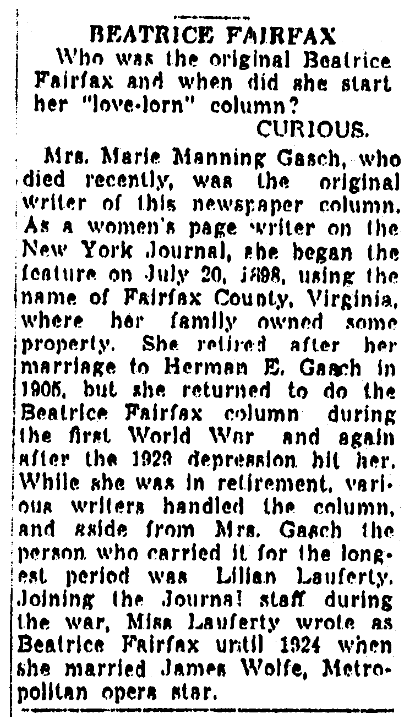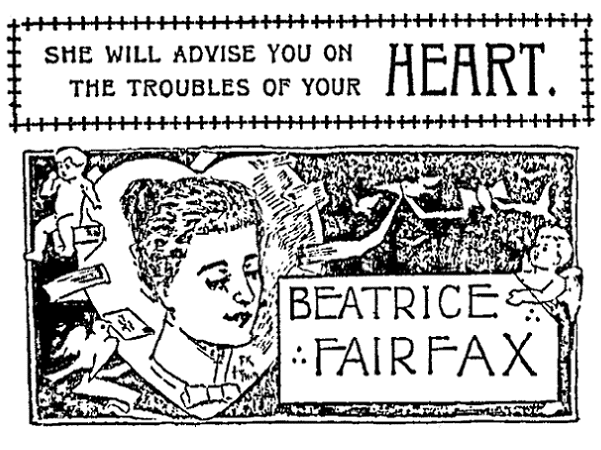Introduction: In this article, Gena Philibert-Ortega writes about the very first newspaper advice column, by “Beatrice Fairfax,” begun in 1898. Gena is a genealogist and author of the book “From the Family Kitchen.”
Advice columns have been one of the mainstays of newspapers since the 20th century. Writers such as Ann Landers, Dear Abby, and Dr. Joyce Brothers are well known today as newspaper columnists that doled out advice on everything including love, etiquette, and family relationships.
But where did this idea come from to write your most burning questions to a stranger working for a newspaper? Especially when those questions concerned private matters like falling in love, whom to marry, or when to file for a divorce?
“Beatrice Fairfax” is credited for being the first newspaper advice columnist. She was “born” in 1898 when journalist Marie Manning (later Gasch) suggested her newspaper, the New York Evening Journal, start a column in response to the letters they were receiving from readers of their women’s page asking for advice. Manning suggested a regular advice column, and started answering letters using the name Beatrice Fairfax. Over time, the column became so popular that it is said the Post Office refused to deliver the enormous number of letters that the newspaper received on a daily basis.*

Advice to the Lovelorn
From 1898 to the 1960s, Gasch, along with a few other writers, would answer these letters in the syndicated column “Advice to the Lovelorn.” Fairfax answered queries from readers both male and female, young and old, who wrote about their love dilemmas.
The first “Advice to the Lovelorn” columns featured a cartoonish illustration and this preamble:
“All young men and women have love affairs. At such times they need advice. Often it is impossible to obtain it from their families. Families are notoriously unsympathetic in such cases.
“The Evening Journal, through Miss Beatrice Fairfax, will help all such young persons. Miss Fairfax is a Virginian. She is a woman of experience. She has read and observed widely. She is young enough to sympathize with love’s young dream. She will answer, to the best of her ability, all letters on subjects pertaining to the affections.”
Here is the very first advice column, published by the New York Evening Journal on 20 July 1898.
Over time, the look of the column changed – but the advice remained consistent and strong. Here is another column, published just 12 days after the original.
Not surprisingly, the majority of the questions involved intimate relationships. For example, this 1903 column answers a young woman writing about a love interest of six months who has asked her to marry him. She points out that although she thinks she loves him, she doesn’t think of him at all when he’s not around. Fairfax’s advice is that “‘out of sight, out of mind’ should bear no part in love.”
However, despite the column’s title, not all of the advice given by Fairfax was about love. Take this 1910 question for example, which is about prevailing etiquette. The writer asks whether a gentleman should pick up a handkerchief that a lady has dropped.
This 1920 “Advice to the Lovelorn” column involves friendships with married men and those between a bachelor and a married woman. The first letter, from a reader who is friends with a much older married man, has Fairfax warning that she is just inviting unhappiness.
The second letter involves a male friend wanting to invite a newly married woman out. Fairfax cautions that although it would be ok to attend an event with this man if her husband was accompanying her, the act of a single man inviting a married woman out without her husband “…suggest[s] that you are already a bit bored by the society of the man you married, only four months ago.”
The problems of previous generations are still issues today, such as this 17-year-old girl from 1934 who isn’t sure she likes her boyfriend and doesn’t get along with her own mother. Fairfax answers:
“If you’re tired of the same old boyfriend then you SHOULD make a change… Too young to be picking a husband anyway at 17… Do try to be properly sweet to the only mother you have. You wouldn’t think of being sassy to outsiders – so why should you permit yourself to be that way to the folks at home?”
The writer also asked if she should get a job, which Fairfax answers with the suggestion that she not only get that job but buy something nice for her mother.
Newspapers, Radio, and Today
Fairfax’s popularity extended beyond the newspaper pages and included a 1930s radio program that provided her another forum in which to answer the public’s questions.
“Beatrice Fairfax” continued to answer questions after the originator of the column, Marie Manning Gasch, passed away in 1945. But Fairfax’s popularity was much bigger than her originator. Fairfax was a celebrity for some of the same reasons other fictitious women – for example, Betty Crocker – were. She provided answers to an inquisitive public. Fairfax’s legacy can be found in the advice columns that pepper newspapers today, and the readers who continue to ask questions in anonymity.
* “The Original Dear Abby,” Mental Floss (http://mentalfloss.com/article/33542/marie-manning-original-dear-abby: accessed 29 December 2018).
Related Article:
